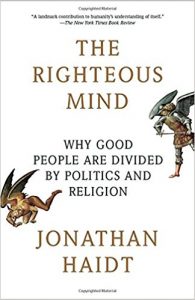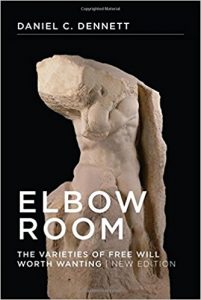This book was recommended to me by a friend, and I’ll recommend it to you. There’s a lot here, so I won’t try to unpack it all. But, the basic core here is that it’s  a book about moral psychology, or what you might call an empirical look at human morality. The author argues that different cultures and groups (he puts especial focus on liberals vs. conservatives vs. libertarians) often disagree because their moral frameworks emphasize different aspects of shared moral values. This is interesting on its own, but Haidt adds an argument about how and why humans tend to view their personal moral value system as the only true one, which results in uncooperative “righteous” behavior.
a book about moral psychology, or what you might call an empirical look at human morality. The author argues that different cultures and groups (he puts especial focus on liberals vs. conservatives vs. libertarians) often disagree because their moral frameworks emphasize different aspects of shared moral values. This is interesting on its own, but Haidt adds an argument about how and why humans tend to view their personal moral value system as the only true one, which results in uncooperative “righteous” behavior.
This is an interesting approach, especially in that it turns what most people would call “outrage” into “righteousness” which reframes it in a way that’s interesting to consider.
I’m not sure I’m down for all of it. In particular, there’s an argument about group selection that (like a lot of arguments about multi-level selection theory) seems to me to be semantic to a large degree, and perhaps to overplay the idea that group selection is some sort of scientific heresy. At least in my experience talking to biologists, the general view has been “there’s a version of group selection that, if defined the right way, we all accept.” But, maybe that’s my limited view as someone who wasn’t a biologist in the 70s, and who hasn’t ever picked a fight with Richard Dawkins.
But, Haidt does a great job of offering a pathway to understanding each other in an increasingly polarized political climate. That, and all the interesting facts and arguments, make this a very enjoyable read.

 the book is spent talking about computer, biology, evolution, and so forth, which to me seems like a sort of sideshow. If so, it’s an especially egregious sideshow, since Dennett frequently complains of perilously misleading elements stuck into philosophical theories.
the book is spent talking about computer, biology, evolution, and so forth, which to me seems like a sort of sideshow. If so, it’s an especially egregious sideshow, since Dennett frequently complains of perilously misleading elements stuck into philosophical theories.